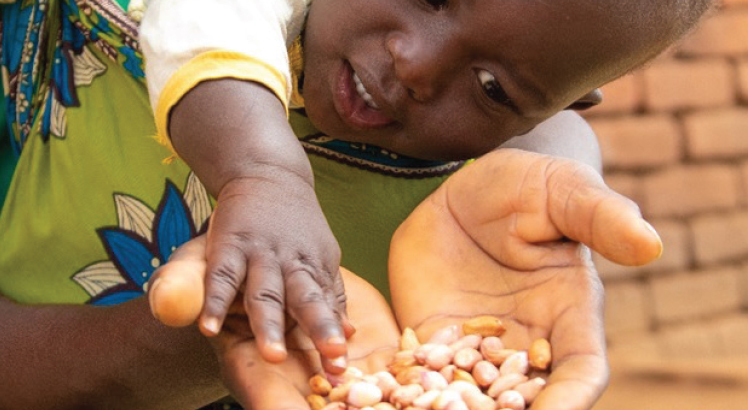Soft bites for solid starts
I
t is 9am and Elizabeth Momba is preparing soft porridge for a baby napping on the veranda of her house in Mkwepu Village in Phalombe District.
She has exclusively breastfed the one-year-old for six months since he was 30 minutes old.
“Breast milk is natural food containing all vital nutrients a child needs for a healthy start. I only introduced Brazio to the nutritious soft porridge after six months, when his intestines were ready for soft food,” she says.

A bit of everything
The pudding contains something from six food groups a baby requires for proper body and brain development.
“I don’t want Brazio to become stunted or a slow learner later in life,” says the mother of three.
Momba was born 31 years ago when most mothers in Malawi would only feed a baby if it wept. She did the same with Brazio’s siblings, but not any longer.
“I stopped after learning recommended feeding practices for babies, including complementary feeding. Chrissie Mahilasi, a nutrition promoter in my neighbourhood, helped me understand why my first-born child was weak and sickly,” she states.
Early childhood care
The complementary feeding personifies her struggle to offer Brazio a solid start for better chances in life.
The Hunger Project is working with volunteers in Phalombe to promote nutrition as part of early childhood development (ECD). The nutrition project funded by KfW, a Germany bank, through Unicef has popularised the importance of breastfeeding, complementary feeding and diversified diets in a child’s first years.
“ECD involves more than just sending children to community-based childcare centres. Nutrition is equally crucial in giving a child a solid start to achieve their full potential. That’s why we have integrated nutrition, sanitation, hygiene and other ECD services so that the parent has vital information from nutrition promoters as well as caregivers at the nearest CBCCs,” explains Isaac Mkangama, from the Hunger Project.
Momba sounds determined to give Brazio a healthy start before enrolling at Chimbiri CBCC in the vicinity as did his two sisters.
She doesn’t give him nsima or thick porridge, but the watery plateful containing a handful from the six food groups recommended by nutritional promoters who work with pregnant women and breastfeeding mothers.
“I have been giving him the soft porridge spiced with pounded vegetables, groundnuts and fish since he was six months old. I also give him fruits in season such as mangoes, oranges or avocadoes,” she explains.
Momba pounds the items using a pestle and mortar and stirs the ground vegetables from her backyard garden and peanuts from surrounding fields and fish from a nearby market in boiling porridge on a cookstove in a clean kitchen.
She credits the built-in cookstove with halving the firewood once consumed by open fires and smoky fumes that endanger the health of women and children.
The mother steers the mix until it is ready for her baby.
And she adds eggs to Brazio’s plateful.
Beating the yolk in a cup, Momba explained: “Gone are the days babies were being constipated with nsima and thick porridge.
“I don’t want him to be malnourished. Malnutrition retards a child’s physical growth and ability to learn.”
Strong foundation
Nutrition, sanitation and hygiene in the first eight years of a child are crucial for optimal development, but nearly one in every three children aged under five in the country is stunted, shows the Malawi Demographic and Health Survey of 2015. The low size for age is a sign of severe malnutrition, which compromises the health, growth, learning and productivity of many children in Malawi—denying them a firm foundation to grow into productive citizens.
Momba happily helps Brazio escape impaired growth caused by poor nutrition, sanitation and hygiene.
In May, the baby’s mid-upper arm circumference measured 12.3cm, a confirmation that he is healthy.
“My son deserves the best, not a raw deal. A good start is vital because you cannot have a strong house with a shaky foundation or bumper yields if you don’t care for the nursery,” she reasons.
Bright future
Momba wishes Brazio stays the course.
“Thanks to breastfeeding and complementary feeding, my son looks strong, not sickly. His eyes are active. If this continues, Brazio is most likely to spend more time in school, perform well and become what he wants.





